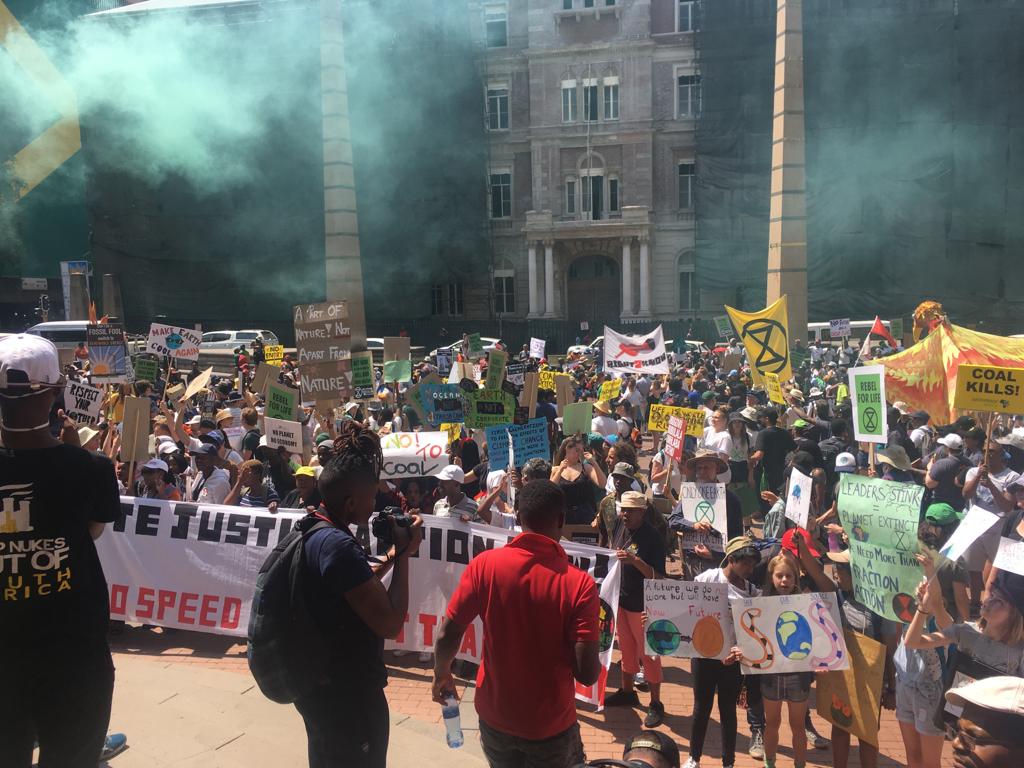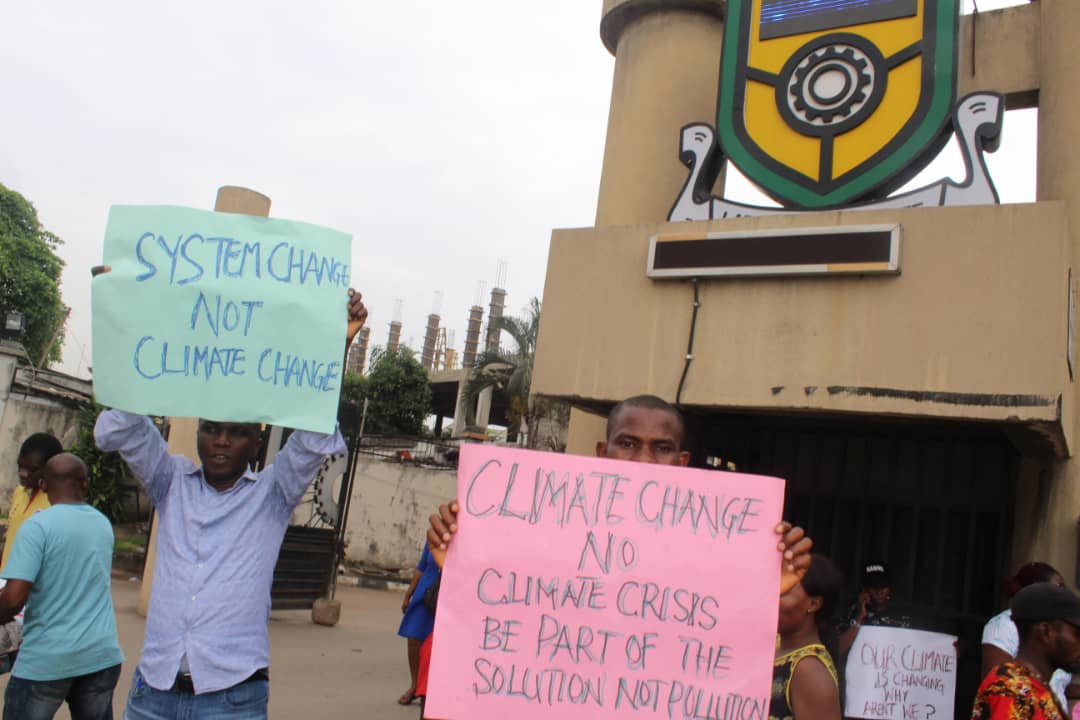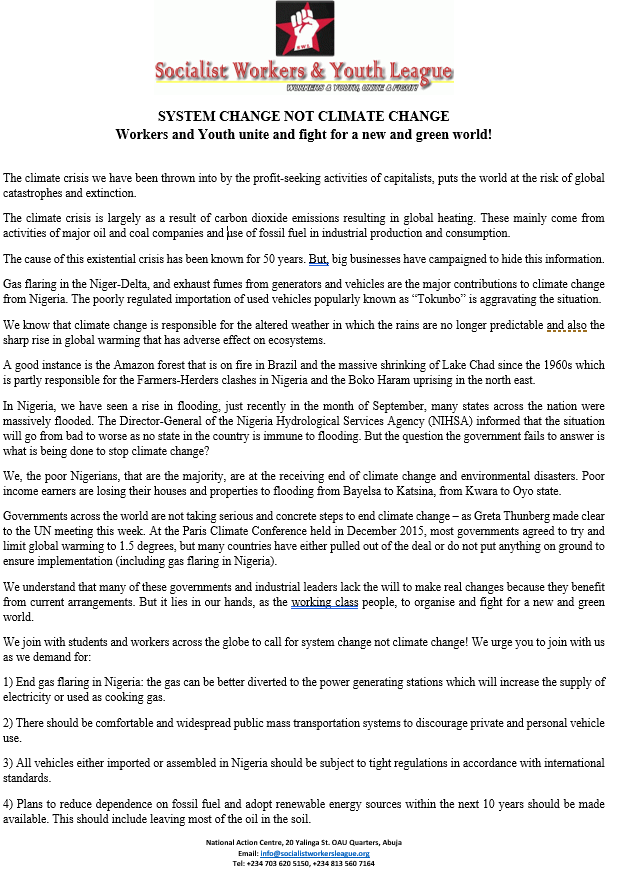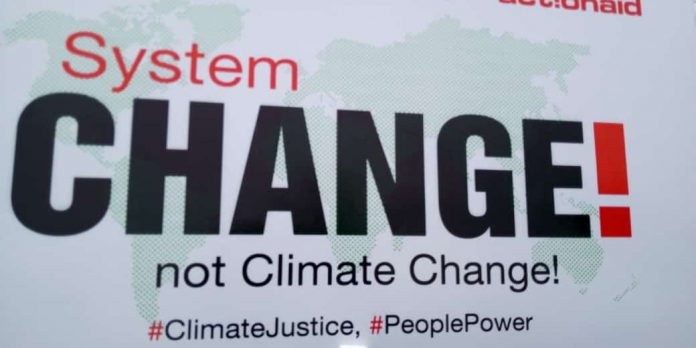More than 6 million people took part in protests and strikes demanding global action to end the climate crisis, during a “Global Week for the Future”. This took place across 4,500 cities and towns in almost 170 countries between 20 and 27 September.
Two thirds of the protesters took to the streets on 20 September, the opening day of the Global Week in what has been described as probably the largest protest wave against climate change in history. This alone outstripped the number of people who participated in the 15 March Climate Strike, when 1.4 million young people boycotted school in 123 countries to demonstrate against the lukewarm attitude of governments to addressing the existential problem of global heating.
Quite significantly, the working-class took a more active role in the recent global action. Trade unions went on strike in a number of countries and workers joined school students and other youths at the barricades. And in Africa where demonstrations were organised only at Cape Town, South Africa in March, there were demonstrations as well in Johannesburg, Kenya and Nigeria where members of the SWL joined demonstrations organised by Action Aid and Environmental Rights Action in Abuja, and by the Friedrich Ebert Stiftung (FES) Young Workers Training programme in Lagos, on 20 and 27 September, respectively.

It is however unfortunate that the NLC and TUC still remain on the side-lines in this struggle. As we pointed out after the 15 March global day of action, workers and trade unions in Nigeria need to get more involved in the movement against climate crisis. Indeed, the trade union movement should provide leadership, and bring the weight of organised labour to bear in this struggle.
But all hope is not lost. Young workers were not found wanting in mobilising for “system change and not climate change”, from below. Members of the SWL who are participants in the ongoing FES young workers training argued for action to be taken. Their perspectives received unanimous support. And on 27 September, they took to the streets as part of the closing day of the Global Day of Action, at the entrance of the Yaba College of Technology.

In an SWL leaflet circulated during the demonstration, attention was drawn to the interconnectedness of catastrophic events such as the raging fires in the Amazon (in Brazil), and the “massive shrinking of Lake Chad since the 1960s, which is partly responsible for the farmers-herders clashes in Nigeria”.
The leaflet also stressed the fact that poor working-class people are at the receiving end of climate change and environmental disasters, pointing out that those who were displaced and also several others who lost their lives due to flooding in Bayelsa, Katsina, Kwara and Oyo states were poor people and not the rich whose capitalist system is the root cause of the climate crisis.
The leaflet ended with three demands:
“1) End gas flaring in Nigeria: the gas can be better diverted to the power generating stations which will increase the supply of electricity or used as cooking gas.
2) There should be comfortable and widespread public mass transportation systems to discourage private and personal vehicle use.
3) All vehicles either imported or assembled in Nigeria should be subject to tight regulations in accordance with international standards.
4) Plans to reduce dependence on fossil fuel and adopt renewable energy sources within the next 10 years should be made available. This should include leaving most of the oil in the soil.”

“Climate justice on a global scale is totally unthinkable without socialism”
Irish Marxist, John Molyneux analysed the proposition for a “just transition” initiated by trade unionists forty years back and which has been central to the international trade union movement’s position on fighting climate change in recent times. He shows that it is impossible to really have a just transition without ending class privilege and inequality.
Alternatives rooted in capitalism as we know it today will only result in the rich protecting “themselves and their lifestyles in gated communities…. while trying to shift the burden of paying for the transition onto ordinary people.” But things could actually even go from bad to worse, regarding the official response to climate change, if we do not fight for and win the struggle for system change.
Right-wing populists (which the likes of Donald Trump in the US, Jair Bolsonaro in Brazil and Matteo Salvini in Italy might just be forerunners of) could establish authoritarian dictatorships to curtail the associated social crisis, which is already emerging, partly as a result of the climate crisis. It could present an opportunity for them to curtail democratic rights supposedly to safeguard society (which to them means the capitalist logic of exploitation i.e. of both poor working-class people’s labour and nature which is what has resulted in social, economic and climate crises).
The profit motive which drives capitalist “development” is the primary reason for the climate catastrophe. Averting our collective extinction requires an overthrow of the capitalist system. System change, or better put still, socialist revolution requires the expropriation of industrial production, transportation, housing, food production, waste management, water, energy generation, waste management, etc from the bosses who presently organise these for profit. But while such expropriation of big business interests is necessary, it is not sufficient for establishing socialism which is the only alternative that can guarantee an end to the climatic, social and economic crises besetting our generation.
Economic and social life thus wrested from the hands of the vampiric capitalists must be put under the democratic control of working-class people. And the publicly owned commonwealth would be run through democratic planning that ensures genuinely sustainable development, with people and nature at the centre of social life and not the pursuit of profit by a few. For example, effective public transportation would be the norm, drastically cutting down the carbon emission from private cars.
Indeed, to build a better world and avoid the looming climate catastrophe, “a socialist solution is an historic necessity.”
by Baba AYE & Lai BROWN









